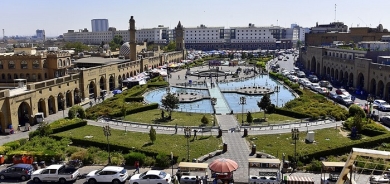Ahmadinejad rivals rack up parliament wins in Iran

Although Iran’s 290-seat parliament has limited sway over key affairs - including military and nuclear policies - the elections highlight the political narratives inside the country since Ahmadinejad’s disputed re-election in 2009 and sets the possible tone for his final 18 months in office.
Reformists were virtually absent from the ballot, showing the crushing force of crackdowns on the opposition. Instead, Friday’s elections became a referendum on Ahmadinejad’s political stature after he tried to challenge the near-total authority of Supreme Leader Ayatollah Ali Khamenei to decide critical government policies such as intelligence and foreign affairs.
The apparent setbacks for Ahmadinejad’s backers, according to early results, could signal a decisive blow in the internal political conflicts and give hard-liners an even stronger voice in Iran’s showdowns over its nuclear program.
The results also greatly reduce Ahmadinejad’s leverage to have a protégé clear the ruling clerics’ election vetting process and become a candidate to succeed him in mid-2013. It now seems likely that only staunch Khamenei loyalists could be in the running.
“It appears that the era of ‘Ahmadinejadism’ in Iran’s political history is gradually coming to an end,” said prominent Tehran-based political analyst Davoud Hermidas Bavand.
What that means is a much bigger comfort zone for the ruling system in a volatile time.
Khamenei said Friday that Iran was moving into a “sensitive period” in the confrontation over Tehran’s nuclear ambitions, which the U.S. and allies fear could lead to atomic weapons. Iran claims it only seeks nuclear reactors for energy and medical research.
U.S. President Barack Obama is scheduled to hold talks Monday at the White House with Israeli Prime Minister Benjamin Netanyahu, who is seeking U.S. backing for a possible military action against Iran but has signaled that Israel was ready to go alone. Israeli officials, however, say no decisions have been made.
The Obama administration has so far backed stronger sanctions that have targeted Iran’s ability to conduct international banking and sell its oil, which accounts for about 80 percent of Iran’s revenue. But in advance of the Netanyahu meeting, Obama stepped up his warnings that it was “unacceptable” for Iran to become a nuclear-armed state because of links to militant groups such as Hezbollah in Lebanon and fears of touching off a regional arms race.
Yet even before all the ballots were counted, some Iranian officials were answering with their own tougher stances.
“Under the present Cold War we are in, this election will increase our national security. It will make the U.S. and the West change its tone toward us,” said Mohammad Reza Bahanor, a hard-line lawmaker seeking re-election.
He predicted 80 percent of the winners belong to a group known as the ultraconservative Motahed, or United Front, which is the main anti-Ahmadinejad group. Full official results, however, were not expected until Sunday at the earliest.
Out of 197 winners that emerged by midday Saturday, at least 102 were conservatives who turned against Ahmadinejad after he openly challenged Khamenei. Also elected were six independent candidates opposed to Ahmadinejad.
The remaining seats were split between Ahmadinejad supporters and centrists. At least 15 races will have to be decided in runoffs.
Among the prominent anti-Ahmadinejad victors were: Gholam Ali Haddad Adel, whose daughter is married to Khamenei’s son; and parliament speaker Ali Larijani, who was Iran’s former nuclear negotiator.
There were no immediate claims of irregularities - which touched off the huge protests in 2009 after accusations the results were rigged. But at least one Iran watcher, Israel-based analyst Meir Javedanfar, raised questions about the loss of Ahmadinejad’s younger sister, Parvin, who was running for parliament in her home region southeast of Tehran where the family remains popular.
“This is likely to lead to even more infighting,” he said.
Already, Ahmadinejad’s opponents are making plans for an unprecedented slap.
Last month, lawmakers approved a petition to summon Ahmadinejad for public questioning over a long list of accusations, including corruption and his high-profile feud with Khamenei. The parliament - which remains in session until the new chamber is seated in May - is expected to demand Ahmadinejad appear early next week, which would make him the first president ever to be dragged before lawmakers since the 1979 Islamic Revolution.
“Ahmadinejad is almost politically spent,” said the analyst Bevand.
But others, such as political commentator Ali Reza Khamesian, said it’s still too early to fully count Ahmadinejad out. “He won’t give up,” he said.
His spectacular falling out with Iran’s ruling theocracy underscores the lopsided nature of Iran’s political establishment. The president may be the international envoy of the country, but all the real power rests with the theocrats and their guardians, including the military-industrial machine of the Revolutionary Guard.
Ahmadinejad’s gambit sought to cut into the policymaking domain of the ruling clerics, which control all the key appointments and decisions. The rupture came in April when he openly opposed Khamenei’s order to reinstate the intelligence minister, who had been dismissed by Ahmadinejad. The president then boycotted government meetings for more than a week in protest.
The ruling system fired back with a wave of arrests and purges of Ahmadinejad allies. Hard-line media also began to smear Ahmadinejad’s confidant, Esfandiar Rahim Mashaei, as head of a “deviant current” that sought to undermine Islamic rule. Some critics even claimed that Mashaei conjured black magic spells to cloud Ahmadinejad’s judgment.
Interior Minister Mostafa Mohmmad Najjar said turnout in Friday’s election was 64.2 percent among 48 million eligible voters. That would be significantly higher than the 57 percent in the 2008 parliamentary elections. If confirmed, the figure will be used by authorities to try to discredit the opposition’s strength and their backing in the West.
“International media were surprised by the high turnout,” state TV proclaimed Saturday. “It was a slap in the face of the U.S.” The front-page headline in the hard-line daily Kayhan Saturday said the enemy was “checkmated.”
(Reuters)














